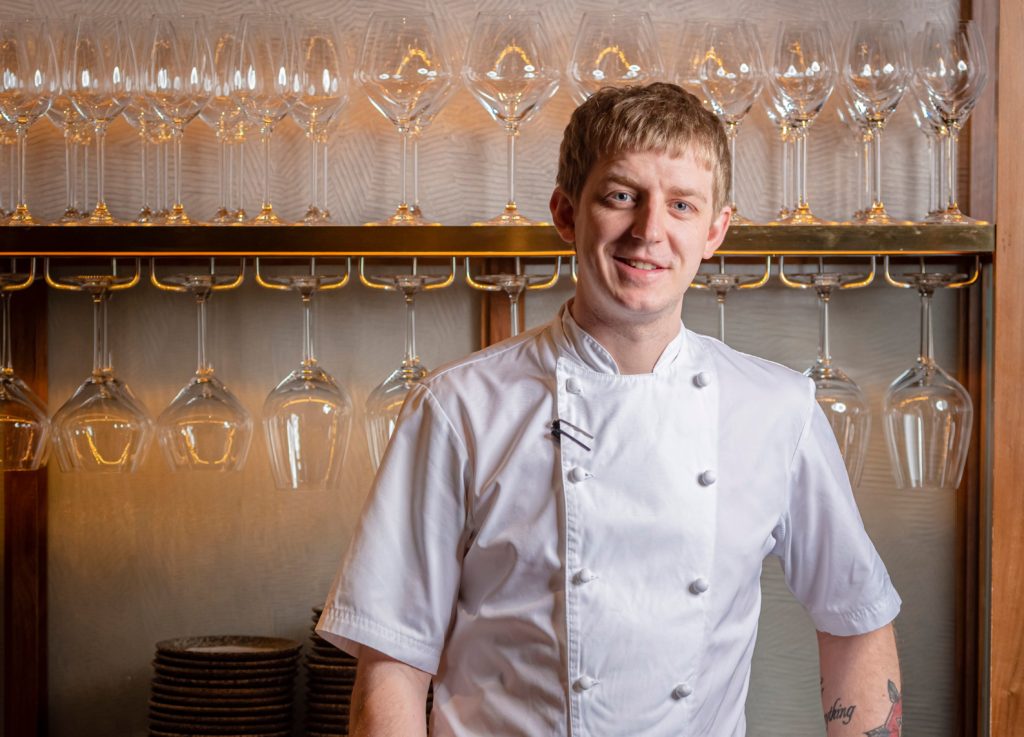Hong Kong may have a reputation for its high pollution levels and excessive waste, but its ranking as the ninth most sustainable metropolis out of 100 cities and 2018 spot as Asia’s second most sustainable city shows that we’re on the right path—but there’s still a long way to go. Its lack of renewable energy sources and high greenhouse gas emissions makes it more prone to natural catastrophes. In a bid to resolve this issue, recent years have seen an increase in government sustainability development programmes as well as local independent initiatives like zero-waste grocery shopping, beach clean-ups and more plant-based options.
As a major foodie nation, residents are also looking for sustainable-driven dining to incorporate a healthier lifestyle, which ideally, we can learn from and bring home to our own kitchens. Here are Hong Kong’s top sustainable chefs sharing their top tips for healthy home cooking…

Chef Richard Ekkebus of Amber
In 2019, Richard Ekkebus revamped long-term favourite French fine dining Amber at Landmark Mandarin Oriental into a sustainable gastronomic hub for discerning diners. The transformation led to the win of the Sustainable Restaurant Award at Asia’s 50 Best Restaurants 2020 and an incredible two Michelin stars. Yet, the Netherlands-born chef had a simple vision in mind with great passion, to push the sustainable dining movement in Hong Kong and provide a menu that incorporated less meat, dairy and refined sugars to keep the focus on clean eating. Ekkebus shares with us how to create balance in your diet:
“My sustainable cooking tip is to shift the animal protein to plant-based ratio within your meals. At Amber, we favour plant-based options: food accounts for 25-30% of greenhouse gas emissions, while livestock production alone accounts for 15% of all greenhouse gas emissions. Making your meal less animal-protein-centric helps reduce your overall environmental impact and will show that a delicious meal doesn’t require animal protein. At Amber, we define vegetable-led dishes as those emphasise and celebrate vegetarian ingredients. This would include, but is not limited to, fruit and vegetables, whole grains, beans, pulses, soy or other protein alternatives, nuts and seeds, plant oils and so on. At Amber, we aim constantly to have a 30:70 ratio between animal protein and plant-based ingredients in our menus”.— Richard Ekkebus, Director of Culinary Operations and F&B, The Landmark Mandarin Oriental, Hong Kong
Follow Chef Ekkebus on Instagram
See also: Beauty-Inspired Afternoon Teas In Hong Kong To Indulge In This Season

Chef Ashley Salmon of Roganic
Roganic’s zero-waste philosophy earned it a Michelin Green Star, the first sustainable dining accolade in the Michelin Guide Hong Kong Macau 2021. British chef Simon Rogan’s farm-to-table concept puts the restaurant at the forefront of sustainable gastronomic practices, from its locally sourced ingredients from Zen Organic Farm, Wah Kee Farm and New Age to the plastic-free Nordaq filtered water. Head Chef Ashley Salmon shares a quick recipe to celebrate summer fruits and how to preserve them:
“Summer is the season of fruits and vegetables, with the surplus of fruits, so I would suggest a simple preservation tip, and to give fruits a more savoury or acidic flavour. Method: Simply mix the surplus fruits with salt (2% of fruit weight) and place them in a sterilized airtight jar and leave it in a warm(ish) place for a few days until the fruits take on savoury flavours but are not overbearing. Transfer the jarred fruits to a fridge and serve with honey and yogurt or juice—you can use it in jams/chutney to add a different flavour profile to your dish”. — Ashley Salmon, Head Chef, Roganic
Follow Chef Salmon on Instagram

Chef Peggy Chan of Grassroots Initiative & Zero Foodprint Asia
Chef-restauranteur and entrepreneur Peggy Chan has been one of Hong Kong’s leaders in clean eating and vegetarianism since the conception of the now-defunct Grassroots Pantry followed by Nectar. Since then, she’s shifted her focus to Grassroots Initiative, a sustainable operations consultancy firm, and Zero Foodprint Asia (an extension of Zero Foodprint (ZFP) in California), a nonprofit organisation to help regional agricultural climate solutions. Chan gives us a quick cooking tip on how to utilise good bacteria, vitamins and minerals:
“Fermentation is a traditional method of food preservation that also happens to enrich foods with good bacteria, vitamins and minerals. Unlike modern methods (refrigeration, freezing, packaging, adding artificial preservatives etc.), it requires little to no energy to produce, does not emit greenhouse gases, nor does it reduce the nutritional content of food. Using fermented food waste as compost can also boost soil health with beneficial bacteria. It also makes plants resistant to pathogens and helps reduce carbon release from farming”. — Peggy Chan, Restauranteur, Founder of Grassroots Initiative Consultancy
Follow Chef Peggy on Instagram
See also: Luxury Summer Wellness Staycations To Book In Hong Kong

Chef Corey Riches of BEDU
BEDU recently launched its ‘Eat Your Way to Restoring Our Earth’ programme to help fund regenerative farming projects in Hong Kong in partnership with Zero Foodprint Asia. Meraki’s Executive Chef Corey Riches curates a menu of Middle Eastern street food with a sustainable conscience. Chef Riches shares with us his waste-free cooking tip, as inspired by his grandmother:
“Waste is taste. My number one sustainable cooking tip at BEDU is to waste nothing. There is so much flavour in everything, from the vegetable trimmings to bones and offcuts that give that deep umami flavour. My grandmother raised 10 kids and had to make her money stretch, so everything in the kitchen was utilised economically. I learned this from her and aim for as little waste as possible at BEDU to manage both our costs, and our environmental impact. We use vegetables from the skin to the core to make soup and stocks, like our Roast Chicken Glaze that’s poured over the Local Feta Stuffed Cabbage. I also plan our daily specials to ensure any fast-perishables are utilised and never wasted. Old-school preservation methods of pickling is another great hack – cauliflower, radish and chillies are all incorporated in our menu”. — Meraki Executive Chef Corey Riches
Follow Chef Riches on Instagram



